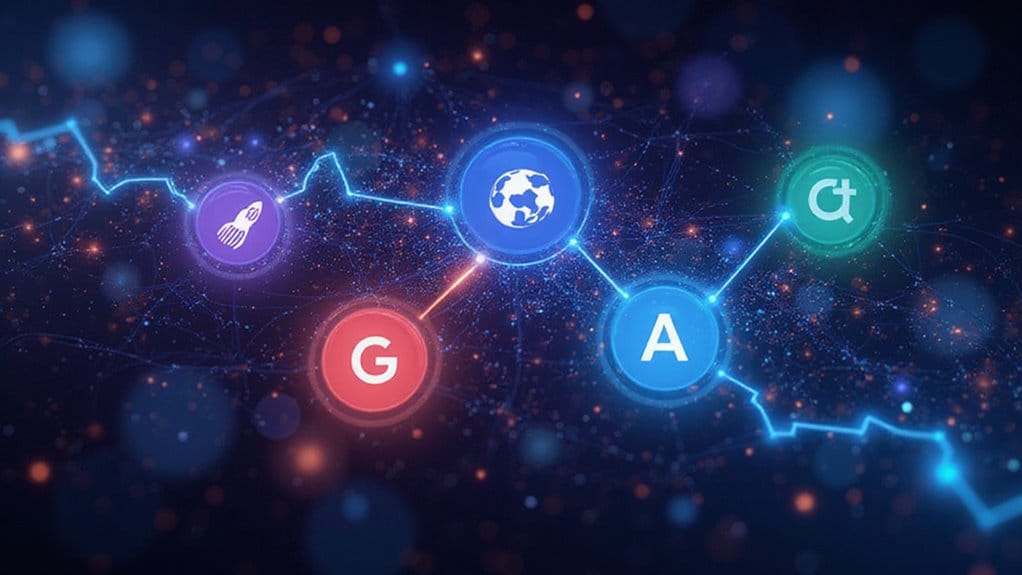Looking to immerse yourself in AI and ML? Start with solid online courses from Coursera’s “AI for Everyone” and hands-on fun at DataCamp. Next, tackle cool projects like classifying song genres or recognizing American Sign Language to apply your knowledge. Familiarize yourself with Python and R—these are your bread and butter, not just fancy words. Don’t forget to network! Join forums and attend conferences, because who doesn’t want free wisdom from the pros? Stick around for more expert tips!

As technology continues to advance at lightning speed, one might wonder why artificial intelligence (AI) and machine learning (ML) aren’t part of everyone’s toolkit yet. Well, fear not, aspiring tech wizard! The world of AI and ML is more accessible than you think, thanks to a plethora of online courses and vibrant online communities.
The first step? Find a course that suits your style. Check out Coursera’s “AI for Everyone” if you want to immerse yourself in AI basics without drowning in jargon. Want to get your hands dirty? DataCamp offers interactive courses that make learning feel like a game. Learning AI is increasingly relevant due to its impact on work and life, so starting your journey today can set you up for success in the future. ML enables machines to learn from experience, making it a valuable tool in various projects and applications. Additionally, courses often include hands-on projects that help solidify your understanding through practical experience.
Find the perfect course for your learning style—dive into AI basics with Coursera or play with interactive projects on DataCamp!
Now, let’s talk about project ideas. You could classify song genres or build a model for recognizing American Sign Language. See? It’s not just about theory; it’s about applying what you learn.
Don’t forget about the essential tools and programming languages, like Python and R. They’re your best friends in this journey, especially with libraries like NumPy and Pandas for data manipulation. And yes, you’ll need to grasp some math concepts—linear algebra and calculus may sound intimidating, but they’re just tools to help you understand the magic behind AI.
Looking for a community? Immerse yourself in forums where like-minded learners gather. GitHub is a fantastic platform for collaborating on projects and sharing ideas.
Attend conferences like the MLOps Summit to network with industry professionals—who knows, you might just find your future mentor there.
Frequently Asked Questions
What Programming Languages Are Essential for AI and ML Beginners?
For AI and ML beginners, Python is the go-to language, thanks to its user-friendly syntax and powerful libraries.
Seriously, if you’re not using Python, what are you doing?
R programming is also essential, especially for data analysis—it’s like having a magic wand for statistics!
Don’t forget C++ for speed, and Java for those big projects.
Immerse yourself in these languages, and watch your AI skills soar.
Start now, or be left behind!
How Long Does It Take to Learn AI and ML?
Learning AI and ML isn’t a sprint; it’s a marathon! The learning timeline for beginners can range from several months to a few years.
Want to speed up? Use effective study strategies! Start with programming basics, then tackle machine learning concepts. Dedicate time weekly, and don’t forget to apply what you learn in real-world projects.
Are Online Courses as Effective as Traditional Education for AI and ML?
When comparing online learning effectiveness to traditional education for AI and ML, the debate heats up.
Sure, online courses offer flexibility and accessibility, but don’t underestimate the power of face-to-face interaction.
Want quick feedback? Go traditional. Prefer to learn at your own pace? Online’s your buddy.
Just remember, distractions lurk online!
What Are Common Career Paths in AI and ML?
In the vast world of AI and ML, two common career paths stand out: data scientist roles and machine learning engineer positions.
Data scientists immerse themselves in data, pulling out insights like a magician with a hat. Meanwhile, machine learning engineers build and fine-tune models, transforming data into smart solutions.
If you’re itching to join, get those coding skills sharp and embrace continuous learning—because the AI revolution waits for no one! Don’t get left behind!
Is Prior Math Knowledge Necessary for Studying AI and ML?
Prior math knowledge is not just helpful; it’s essential for diving into AI and ML.
Think of math prerequisites as your foundational skills, like a sturdy base for a skyscraper. Without linear algebra or calculus, you’re building on quicksand!
Want to optimize algorithms? You’ll need calculus. Analyzing data? Get cozy with statistics.









